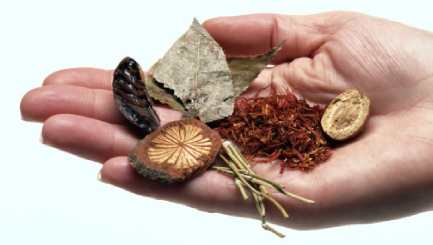Ayurveda And Heavy Metal: An Unfortunate Combination
 Ayurveda is based on the scriptural knowledge of healing practices taken from ancient India. It is fast establishing itself in the Western complementary health market and offers a full alternative medical treatment including its own theoretical background, diagnostic methods and prescription of dietary supplements and medicines. The diet and lifestyle recommendations it makes, usually based on body type, provide an excellent path to wellness for many of us. However, there is considerable wariness in some quarters about the quality of imported Ayurvedic products.
Ayurveda is based on the scriptural knowledge of healing practices taken from ancient India. It is fast establishing itself in the Western complementary health market and offers a full alternative medical treatment including its own theoretical background, diagnostic methods and prescription of dietary supplements and medicines. The diet and lifestyle recommendations it makes, usually based on body type, provide an excellent path to wellness for many of us. However, there is considerable wariness in some quarters about the quality of imported Ayurvedic products.
Ayurvedic medicine concerns itself with creating holistic wellbeing in individuals. The first requirement in Ayurvedic treatment is a diagnosis of your body type. Individuals will fall into the categories of Kapha, Pitta or Vata, and the majority will be a mixture of two of these. Theoretically, a person who is a balanced mix of all three will already be functioning in a condition of perfect wellness. Body types can be determined by appearance as well as behaviour, with Kapha types having a larger build, Pitta types medium and Vata types petite. Each type is thought to have a predisposition to a particular type of heath problem; for example, Vata types tend to have digestive problems including gas and bloating. Such a condition would be treated by dietary advice leaning towards warm, cooked and liquid foods as well as herbal supplements such as Triphala.
Triphala is a frequently prescribed Ayurvedic supplement believed to aid digestive problems. It is made from the dried powder of three fruits: Indian gooseberry, black myrobalan and belleric myrobalan, which are thought to reduce stomach acidity and slow the action of stomach enzymes. Triphala is considered safe by the medical establishment, but the same cannot be said for Guggul – another highly prescribed Ayurvedic supplement. Guggul is derived from plant resin and has been used inIndiafor thousands of years. However, questions have recently been raised about its safety for human consumption, and the issue has led to controversy between Western and Indian health practitioners.
The controversy began in 2011 after a young woman experienced complete liver failure after taking a dietary supplement that incorporated Guggul. Since this time, a series of accusations regarding the presence of heavy metals in Ayurvedic medicines have opened up a troubling issue. A traditional way of producing these supplements is to lace the herbs with metals or minerals – a practice known as ‘rasa shastra’ and based on the logic of alchemy. The use of ‘rasa shastra’ medicines has led to multiple instances of heavy metal poisoning in theUS, traced back to Ayurvedic supplements purchased online. Research has since shown that lead is most commonly present in this type of Ayurvedic medicine, followed closely by mercury and arsenic. The risk has been found to be equal between products produced in India and products produced in the US, with ‘rasa shastra’ labeled medicines twice as likely to contain metals as those without this designation.


Comments are closed.